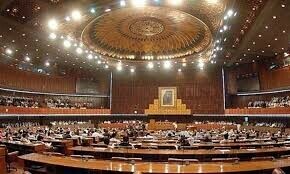ISLAMABAD: Certain provisions of the constitution dealing with disqualification of parliamentarians under Article 63A for defecting from their parties represent an extraordinary danger that may make members susceptible to external pressure on issues which have nothing to do with the stability of the parliamentary democracy, says Justice Jawwad S. Khawaja.
The Supreme Court judge made the observation in his 80-page dissenting judgment which sought to strike down the 21st Amendment under which special courts manned by military officers were set up to try hardened terrorists.
In his opinion, Justice Khawaja said, the words “or a Constitution (Amendment) Bill” in clause (1-b-iii) of Article 63A were liable to be struck down because it constituted a breach of the duty cast on a parliamentarian as chosen representative of the people.
Know more: Raza Rabbani in tears: 'Ashamed to vote against conscience'
The words “or a Constitution (Amend-ment) Bill” were inserted in the constitution through the 18th Amendment which were also under challenge before a 17-judge full court of the Supreme Court which dismissed the petitions challenging the 18th Amendment by a majority of 14 to three as well as the 21st Amendment by 11 to six.
The Article 63A of the Constitution deals with party discipline and stipulates that members can be unseated from parliament if found guilty of defection from their parties.
Justice Khawaja recalled that Article 63A was first introduced through the 14th Amendment in 1997 in view of rampant allegations of ill-motivated floor-crossing and the instability it caused in relation to the formation and functioning of the government.
There was a need for introducing an anti-defection provision in the constitution and it was considered necessary to do so because of a desire to strengthen and bring about stability in the parliamentary democracy, Justice Khawaja said, adding that members of political parties individually or collectively had to face the real possibility of being unseated if they defected.
“It must be reiterated that enabling a person, whether within or outside parliament, to influence members of parliament to adhere to party lines when voting on constitutional amendments is in violation of the terms of their oath of office,” the dissenting judgment said.
The constitution itself stipulates that before assuming office every member must take an oath to “preserve, protect and defend the constitution”. This oath requires that when voting on a constitutional amendment, every parliamentarian must search deeply into his own conscience and ensure that he does not become a party to its erosion or destruction.
“This is a fiduciary obligation of a parliamentarian in addition to being a term of his oath of office. Under acknowledged and well settled legal principles established in our jurisprudence, such discretionary responsibility cannot be delegated by a fiduciary nor can it be allowed to be clouded by any external influence,” the judgment said.
Therefore, in making his decision party considerations could not be allowed to influence him, it said, adding that the constitution envisaged the conscience of individual parliamentarians as its own first line of defence – a defence which came into operation even before judicial review could set in.
In the judgment, Justice Khawaja also recalled the chilling effect of Article 63A on members of parliament preventing them from voting their conscience and referred to a media report in which PPP Senator Raza Rabbani, now Senate Chairman, in a choked voice stated that during his time in the Senate he had never felt so ashamed as today in voting for military courts.
Mr Rabbani was a parliamentarian of high standing and moral integrity, Justice Khawaja said, adding that the senator had consistently demonstrated his commitment to advancing the cause of constitutional rule and parliamentary democracy.
It is important to bear in mind that it is not necessary to determine if a parliamentarian was or was not, in fact, influenced by his party head. What is relevant is whether a party head can be allowed the constitutional (as opposed to political or moral) authority to press his views on members of parliament while they vote on a constitutional amendment?
“In my humble view, this plainly is impermissible,” Justice Khawaja observed.
“It may also be noted that the constitution amending function is qualitatively very different from the function which a parliamentarian performs while voting on a money bill, or when he votes to elect the prime minister or when he votes on a no-confidence (or confidence) motion because defection on these matters can destabilise democracy by bringing down a government,” he said.
Published in Dawn, August 7th, 2015
On a mobile phone? Get the Dawn Mobile App: Apple Store | Google Play















































